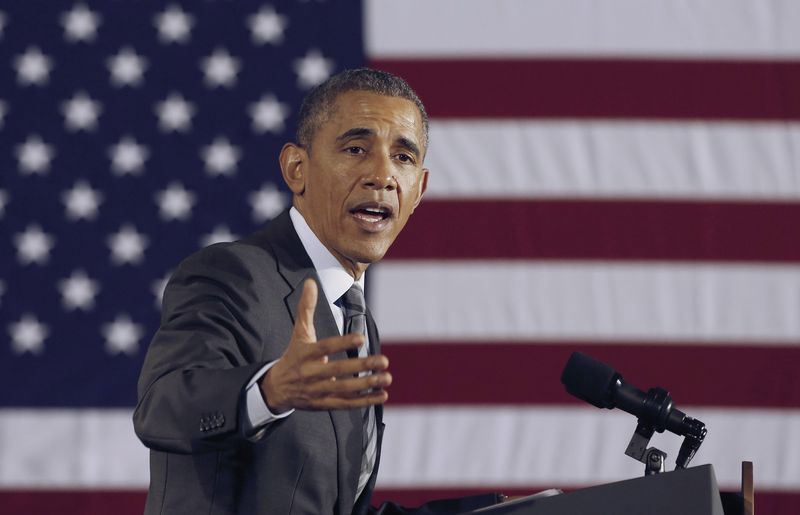By Jeff Mason
WASHINGTON (Reuters) - President Barack Obama on Monday proposed a $3.99 trillion budget that drew scorn from Republicans and set up battles over tax reform, infrastructure spending, and the quest to prove which party best represents the middle class.
In his fiscal year 2016 budget blueprint, a political document that must be approved by Congress to take effect, Obama proposed a series of programs to help middle-income Americans that he would pay for with higher taxes on corporations and wealthy individuals.
He also sought to show that the United States could increase spending in a fiscally responsible way. The budget foresees a $474 billion deficit, which is 2.5 percent of U.S. gross domestic product, a level economists view as sustainable.
Obama's budget fleshes out proposals from his State of the Union address last month and helps highlight Democratic priorities for the last two years of his presidency and the beginning of the 2016 presidential campaign.
"I know there are Republicans who disagree with my approach. And I've said this before: If they have other ideas for how we can keep America safe, grow our economy, while helping middle-class families feel some sense of economic security, I welcome their ideas," Obama said.
"But their numbers have to add up. And what we can't do is play politics with folks' economic security, or with our national security."
Obama spoke from the headquarters of the Department of Homeland Security, a site the White House chose to emphasize its insistence that Republicans fund the agency charged with implementing his controversial executive actions on immigration.
The president said the opposing party would put the nation at risk if they did not fully fund the department. Republicans have threatened to curtail department spending in order to block Obama's executive orders on immigration.
They have said they see room for compromise in areas such as tax reform and infrastructure, but many of Obama's programs, which were rolled out in the weeks before the budget's release, have landed with a thud.
"Today, President Obama laid out a plan for more taxes, more spending, and more of the Washington gridlock that has failed middle-class families," said John Boehner, Republican speaker of the House of Representatives.
"It may be Groundhog Day, but the American people can't afford a repeat of the same old top-down policies of the past."
Democrats, however, viewed the budget as a statement of their priorities and a chance to demonstrate that they represent the party that champions middle-income Americans.
"(It) affords him an opportunity to contrast his vision of helping the middle class with the Republican Congress' approach of exacerbating inequality, ignoring the middle class and making the burdens of those who want to enter it even greater," said Neera Tanden, president of the Center for American Progress, which has close ties to the Obama White House.
INFRASTRUCTURE, TAX REFORM
The budget achieves some $1.8 trillion in deficit reduction over the next 10 years, officials said, through healthcare, tax and immigration reform, but the forecast assumes Republican support for Obama's programs, which is unlikely.
Republicans have blocked immigration reform legislation in the House, for example, and Obama's budget assumes passage of such a bill.
The administration foresees a continuation of the decline in unemployment, forecasting a rate of 5.4 percent in 2015. It currently stands at 5.6 percent.
It also proposes a new infrastructure bank, a 6 percent increase in research and development, and a controversial consolidation of U.S. government agencies. Obama has previously proposed combining trade agencies, but the proposal fizzled.
The budget sets aside $14 billion to strengthen U.S. cybersecurity defenses after a spate of high-profile hackings.
It calls for a one-time, 14 percent tax on an estimated $2.1 trillion in profits piled up abroad by companies such as General Electric (N:GE) and Microsoft (O:MSFT), while imposing a 19 percent tax on U.S. companies' future foreign earnings.
It proposes a 7 percent rise in U.S. domestic and military spending, ending "sequester" caps with reforms to crop insurance programs and closing tax loopholes such as one on "carried interest." Those moves would help fund investments in infrastructure and education.
The budget also would reform rules governing trust funds and raise the capital gains and dividend rates to 28 percent from the current top rates of 23.8 percent.
In foreign policy, the budget funds efforts to support NATO and European allies against Russian aggression.

It requests $8.8 billion to fund U.S. efforts to fight Islamic State militants, bolster Iraq's army and strengthen the "moderate" opposition in Syria.